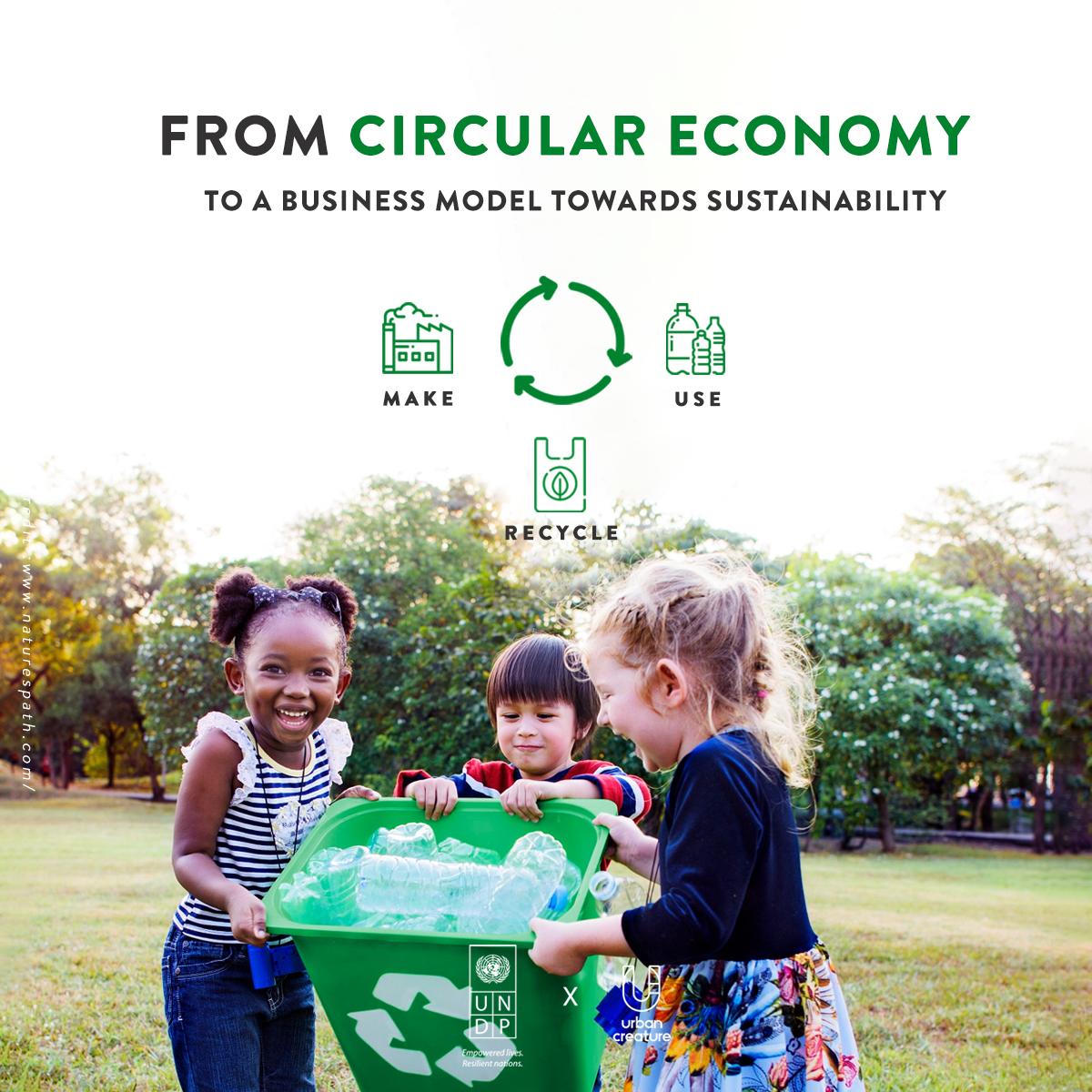- Published Date: 17/10/2019
- by: UNDP
From Circular Economy to a business model towards sustainability

Today, there is no escaping the waste problem that comes as an alarming result of humans’ consumption behaviour. One plastic bag we unfold and carry for no longer than ten minutes takes up to 450 years to degrade. Right now the world is creating approximating 6.3 billion tons of plastic waste, and more than 79% is thrown away or landfilled in nature. The 3R’s – reduce, reuse and recycle – are what we’ve been doing to tackle the crisis but that’s addressing a problem at its effects, not the cause. And the root cause we need to look at is the producer.
For a long time, the world’s economic system has been “linear”. That is a make-use-dispose process in which raw materials mined to make a product and is thrown away after its use. This process drains resources, not to mention produces a substantial amount of waste and releases pollution into the ecosystem. The alternative now is a circular economy, an environmentally friendly make-use-return production process where used goods are kept as materials to create recycled products or further reusable items.
Besides the economic system, in order for a city to become sustainable, it needs to apply the circular principle to other areas, such as built environment (e.g. building design, infrastructure, urban planning), energy systems (alternative energy e.g. biomass fuels), urban mobility system (e.g. electric public transport), an urban bio economy (e.g. the use of alternative materials and decomposition of food waste), the local production system (e.g. adding more value to community products), circular economy legislation and policies (e.g. tax and funding), and awareness, education and research i.e. informing and educating both producers and consumers.
Thailand has begun to adapt in order to tackle the environmental crisis, like public policies that promote and support the circular economy as set out in the country’s 12th National Economic and Social Development Plan (2017-2021) which follows the framework of the 20-Year National Strategy (2017-2036) and the UN’s Sustainable Development Goal 12 on responsible consumption and production.
It is not only the public sector that can bring about change – big and small businesses, organizations and individuals can all play a role in realizing the circular economy. We can learn from Thailand Management Association (TMA)’s circular business model, which has five key principles as follows:
1. Circular Design : the principle of designing products that are long-lasting, durable and reusable. We can look at YETI who produces durable, compact, insulated drinkwares.
2. Circular Supplies : the development of alternative materials such as bio-based materials and recyclable raw materials. Circular supplies also includes using renewable energy in the manufacturing process. For instance, Nike and its Reuse-a-Shoe program which recycle materials from old athletic shoes to create Nike Grind, a material used to create courts, running tracks and playgrounds.
3. Product as a service: opting for rental or pay-for-use services instead of purchase and possession. German consumer electronics retailer Media Markt, for instance, offers customers the option to rent items for a certain period of time e.g. for a festivity or seasonal use.
4. Sharing Platform : the principle of sharing resources through platforms on- and offline. For example, Airbnb who provides a platform for homestay hosts to accommodate guests, often tourists, temporarily; or Uber who provides users a ride service through a smartphone application.
5. Resource Recovery : designing a take-back system in order that unused materials or reusable packages can re-enter the production process. The UK’s M*lkman, for instance, delivers nut milk to customers’ doors and returns to collect empty glass bottles for reuse.
The circular economy not only reduces the impact humans make on the environment and the emission of greenhouse gases, but also helps businesses to save production costs and increase their revenue with technologies that efficiently use their raw materials while creating new investment opportunities and more conscious alternatives for consumers.
Source:
https://bit.ly/317rtmO
#UNDP #UCxUNDP #CircularEconomy